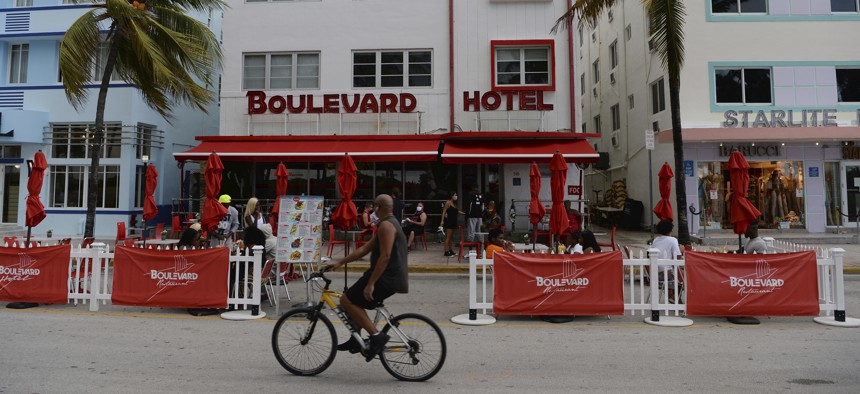State, Local Disagreements About Coronavirus Funding Boil Over

People are seen on Ocean Drive as Miami Dade County is mandating a daily 8 p.m. to 6 a.m. curfew. MediaPunch/MediaPunch /IPX
In Miami-Dade County, officials with the city of Miami are threatening a possible lawsuit, saying the county has shortchanged them. County officials say they need to be conservative with the limited funding.
The limited amount of federal coronavirus aid available to local governments is leading to legal disputes between some cities, counties and states over how the funds are disbursed.
Miami Mayor Francis Suarez said this week that the city is exploring the possibility of taking legal action against Miami-Dade County after lawmakers reduced the amount of money they plan to dole out to 34 cities located in its boundaries.
“Our citizens were entitled to receive, based on population, $81 million in federal help,” Suarez said. “The county proposal would get our citizens as little as $8 million.”
Miami-Dade County received $474 million in federal coronavirus funding through the CARES Act, some of which it planned to distribute to cities in the region. But the amount the county plans to share with cities was recently reduced from $135 million to $30 million, the Miami Herald reported.
On a call Wednesday discussing the friction, Miami-Dade Mayor Carlos Gimenez said the county will still reimburse cities for Covid-19 related expenses but will require that they submit receipts.
“We are not willing to give cities a blank check. We are willing to give them reimbursements,” he said.
The CARES Act, approved by Congress in March, provided $139 billion to state and local governments. But the money was distributed directly only to state governments and localities with more than 500,000 people, leaving smaller cities and counties waiting for funds to trickle down.
Last week, Lebanon County, Pennsylvania sued Gov. Tom Wolf over his decision to withhold CARES Act funding from the county after leaders voted to lift state-mandated coronavirus restrictions. The decision amounts to “a gross abuse of power,” the county wrote in a court filing.
The Pennsylvania General Assembly had approved legislation that would divide $625 million in CARES Act funding among counties in the state and Lebanon County would have received $12.8 million.
“Don’t come saying you want something from the state when you haven’t followed the rules,” Wolf said last week of the decision, according to the Philadelphia Inquirer.
County officials point to these types of disagreements over money as all the more reason why the federal government should appropriate funding directly to local governments rather than rely on states to distribute it.
“It’s not that we don’t want cities to get their fair share,” said Matthew Chase, executive director of the National Association of Counties. “But counties have so many of our own responsibilities we have to meet.”
City, county and state officials are lobbying Congress for more funding in additional coronavirus relief packages, but lawmakers have yet to approve any additional funds for local governments. The latest proposal put forth by Senate Republicans on Monday includes no direct funding for local or state governments. It would give governments more flexibility in how they spend CARES Act funds. However, to use the money to cover revenue shortfalls, a large county that received a direct allocation would have to first distribute 25% of its funding to other local governments within its jurisdiction.
The National Association of Counties called that stipulation “unworkable,” noting that counties are often the branch of government charged with running public health departments, and asked the Senate to abandon the provision.
“Essentially, we would be required to allocate a quarter of our funding to other local governments within our jurisdictions despite the fact that counties are generally responsible for public health,” NACo’s Large Urban County Caucus said in a statement released Wednesday.
Andrea Noble is a staff correspondent with Route Fifty.
NEXT STORY: In California, State Lawmakers Propose $100 Billion Stimulus Plan





